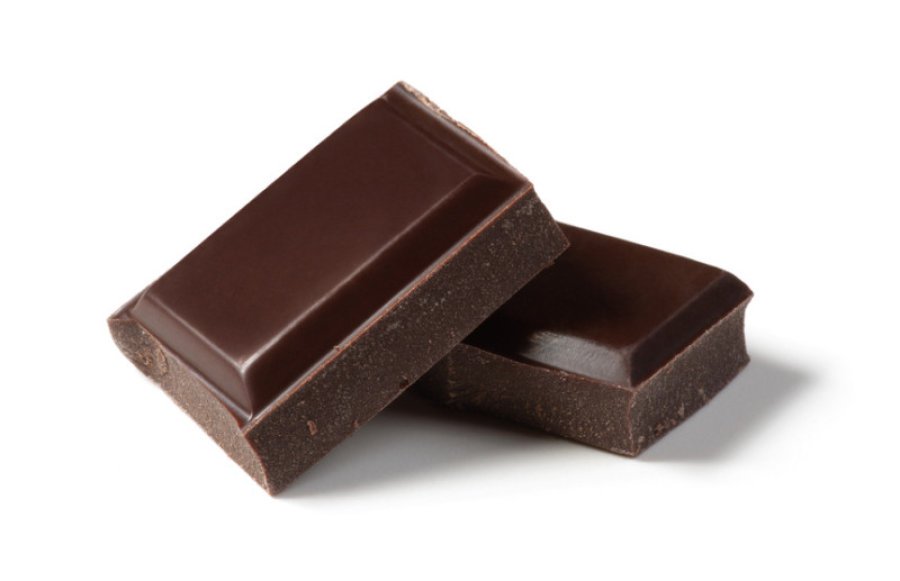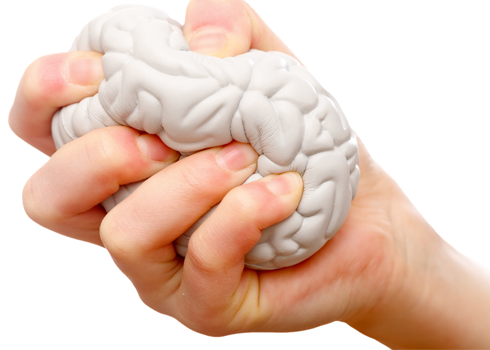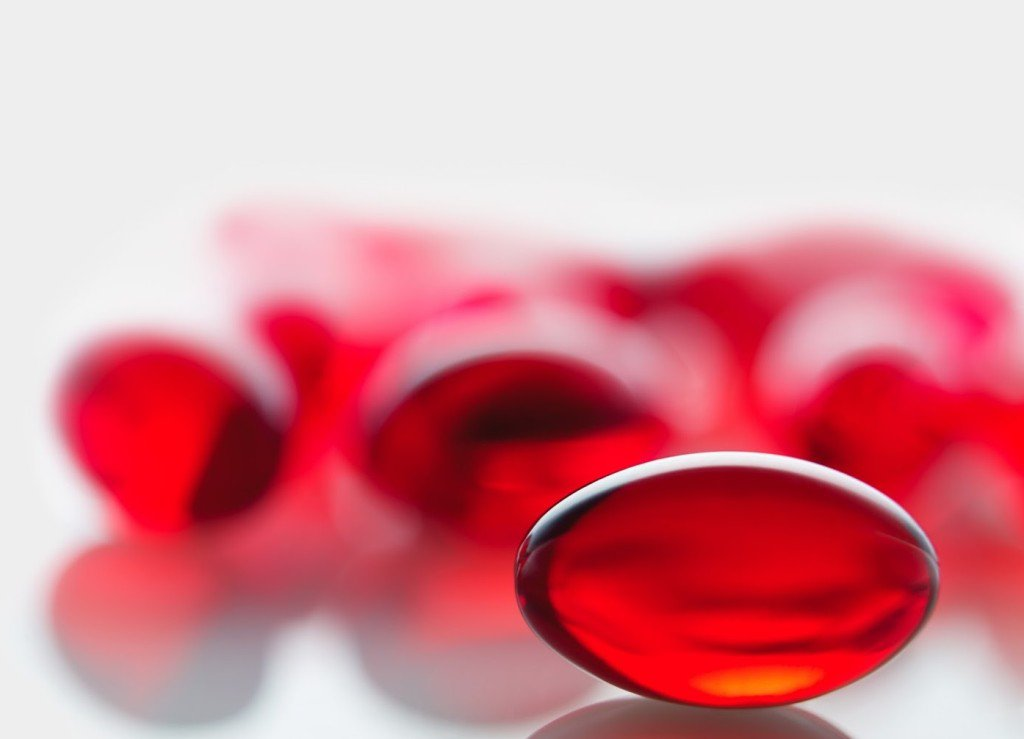Autophagy is an absolutely essential biological process that plays a key role in the normal functioning and survival of your brain cells.
The word autophagy is derived from the Greek words auto and phagein.
Auto translates to “self”.
And phagein translates to “devouring”.
So autophagy essentially means “self-devouring”, or “to eat oneself”.
That may sound scary and something that you would want to avoid…
But it’s actually something you want to embrace and induce yourself.
Because autophagy is a self-cleaning mechanism within our cells, which helps your brain detoxify, repair and regenerate itself.
It destroys the old, damaged, and malfunctioning components of your cells – and rebuilds new and healthier ones instead!
It’s sort of like spring cleaning or replacing old parts of your car.
By inducing autophagy, we are clearing out worn-out and faulty cellular parts within our brain cells.
Our brain cells need to last a lifetime, so autophagy is our body’s unique way of naturally rejuvenating them and defending them from disease.
How Does Autophagy Affect Your Brain and Mental Health?
“What we’ve discovered is that autophagy protects against neurodegenerative diseases like Parkinson’s, Huntington’s and certain forms of dementia. If you switch on autophagy, you remove proteins rapidly, as well as protect against excessive inflammation. By learning how to influence this process, we are able to affect the progression of these diseases.”
Research shows that autophagy supports the central nervous system, improves brain function and reduces neurological cellular breakdown (136-138).
And studies suggest that autophagy is a built-in defense mechanism that detoxifies and clears the central nervous system (139).
But the autophagy process becomes less efficient as we get older.
And over time, our brain cells accumulate a variety of damaged organelles, abnormal and pathogenic proteins, and oxidized particles (141-142).
This clogs up the brain, accelerates cognitive aging, and even contributes to the development of dementia (140).
But autophagy doesn’t just decline in older individuals.
Even younger people with depression and schizophrenia have been shown to have deficiencies in autophagy pathways (162-163).
In fact, researchers have found a link between autophagy dysfunction and many neurodegenerative, neurodevelopmental and neuropsychiatric disorders, including (143-161):
Parkinson’s disease
Huntington’s disease
Schizophrenia
Bipolar disorder
Frontotemporal dementia
Amyotrophic Lateral Sclerosis
Autism spectrum disorders
Fragile X syndrome
Mood disorders
Psychotic symptoms
Behavioural change
The good news is that you can do something about this.
You have the power to activate autophagy.
There are several reliable and natural ways to increase it.
And by doing so, you can reduce neuroinflammation, protect the nervous system, improve cognitive function, encourage the growth of brain cells, and even fight depression and Alzheimer’s disease (164-174).
Read on to learn more about how you can induce autophagy.
The Best Lifestyle Habits and Therapies That Induce Autophagy in the Brain
1. Exercise
Exercise is one of the best ways to boost autophagy in the brain.
Researchers have found that aerobic exercise induces neuronal autophagy (1).
They believe the reason why exercise improves cognitive function is perhaps because it increases autophagy in the brain (2).
Exercise is a stressor on the body, and the body induces autophagy so that your cells can recover from the stress. All it takes is 30 minutes of aerobic exercise to activate autophagy in the brain (3).
As a result, exercise increases neurogenesis and reduces neurodegeneration.
Many doctors and researchers recommend exercise as their number one piece of advice for optimal brain health.
You should find a sport or aerobic exercise routine that you enjoy, so that you’ll stick with it consistently.
2. Intermittent Fasting
“One of the major benefits of fasting is a dramatic increase in autophagy, followed by a massive boost in stem cell production.”
Fasting is another biological stressor that promotes autophagy.
When you’re fasting, your body isn’t receiving nutrients, so it stresses out and triggers autophagy.
Researchers have found that fasting activates “profound autophagy” in the brain (24-26).
As a result, it can help treat neurological conditions and lowers the risk of cognitive decline and neurodegenerative diseases such as Alzheimer’s disease and Parkinson’s disease (27-28).
So how long do you have to fast to trigger autophagy in the brain?
Research suggests 24 to 48-hour fasts are ideal and have the strongest effects (29).
But long fasts are not very realistic and practical.
Luckily, even shorter fasts have been shown to significantly promote neuronal autophagy (30-31).
That’s why I personally eat all my food for the day within an 8-hour window, and then fast for the other 16 hours of the day.
You don’t need to go that long, but you should try to fast for at least 12 hours at a time.
The best way to get started is simply by eating dinner around 6, not eating anything after that before bed, and then eating a regular breakfast the next day.
That should give you about 12-14 hours of fasting time.
3. A Ketogenic Diet
“Ketogenesis is like an autophagy hack. You get a lot of the same metabolic changes and benefits of fasting without actually fasting.”
A ketogenic diet is a very high-fat, low-carb diet.
To follow the diet, you need to get most of your calories from healthy fats, and no more than 10 percent of calories from carbs (less than 50 grams of carbs per day).
When you restrict carbohydrate-rich foods – such as grains, sugar, and even potatoes, legumes and fruit – your body enters “ketosis”, a metabolic state in which your body and brain run on fatty acids and “ketones” instead of glucose.
And this be very beneficial and increase autophagy in the brain.
Researchers have found that ketosis is neuroprotective and reduces neurodegeneration by promoting autophagy in the brain (4-6).
Autophagy reduces amyloid beta, the main component of amyloid plaques found in the brains of patients with Alzheimer's disease (8-9).
An animal study also shows that ketosis reduces brain injury (during and after seizures) by activating autophagy (10).
I follow a ketogenic diet every so often.
Some of the best foods to eat if you follow a ketogenic diet include coconut oil, olive oil, pastured eggs, ghee, grass-fed meat, avocado, nuts and seeds.
These foods are included in my Free Grocery Shopping Guide for Optimal Brain Health.
Research also shows that the ketone bodies stimulates autophagy (7).
4. Circadian Rhythm, Melatonin and Deep Sleep
Getting enough high-quality sleep is very important if you want to increase autophagy.
I used to have very poor sleep and it was one of the main factors that contributed to my poor cognitive function.
Research shows that not getting enough sleep, and waking up intermittently throughout the night, negatively alters autophagy in the brain (11-12).
So it’s the length and quality of your sleep that matters.
That’s why I highly recommend getting at least 7 hours of uninterrupted sleep every night.
What can you do to improve your sleep?
Maintain a proper circadian rhythm
Promote the production and release of melatonin at night
Researchers have found that our circadian rhythm (sleep-wake cycle) controls autophagy and plays a role in cognitive decline (13-14).
Melatonin is a hormone released by your pineal gland, a small gland in your brain.
It helps control your circadian rhythm, and adequate levels of melatonin are necessary to fall asleep quickly and sleep deeply throughout the night.
Melatonin has been shown to induce autophagy in the brain, and it reduces the risk of developing neuropsychiatric disorders (66-68).
Even mild changes in our external environment (i.e. blue lighting at night) can affect our circadian rhythm and reduce melatonin production, negatively altering autophagy and our cognition the next day (13-14).
This sleep supplement contains natural compounds that I’ve used over the years to promote the production of melatonin.
But I work with my clients so that they can naturally produce more melatonin and maximize the quality of their sleep without so many supplements. We have free online workshop that talks about how you can work with us. You can register for the workshop here.
5. Hot and Cold Exposure
Exposing yourself to both hot and cold temperatures can stress your cells and promote autophagy.
Several researchers have found that “heat stress” triggers autophagy and stimulates the autophagic process (15-18).
Autophagy and the heat-shock response are also tightly linked (19-20).
Researchers have found that cold exposure induces neuronal autophagy, and they believe it can reduce the risk of neurodegenerative diseases (21-22).
Research also shows that switching back and forth between cold and hot can induce autophagy (23).
So how does this translate into every day life?
Try switching back and forth between hot and cold in the shower.
Or spend time in a sauna or steam room, and then take a cold shower.
I personally like to go outside with minimal clothing in the winter, and then eventually come back inside and take a hot shower.
Cold plunges, cold baths and cryotherapy are some other ways to expose yourself to cold.
6. Hyperbaric Oxygen Therapy
Hyperbaric oxygen therapy (HBOT) is a treatment that enhances healing and recovery after injury to the central nervous system.
Patients inhale 100% oxygen in a total body chamber.
Usually, oxygen is transported throughout the body only by red blood cells. But with HBOT, oxygen is dissolved into all body fluids, including the fluids of the central nervous system.
This leads to oxygen being carried to areas of the body where circulation is diminished or blocked. As a result, extra oxygen can reach all damaged tissues, including areas that need to heal.
Several studies have shown that HBOT elevates and enhances autophagy in the central nervous system (41-44).
You’ll need to find a practitioner or clinic in your area that provides this treatment.
7. Acupuncture
Acupuncture is an alternative treatment that has been shown to induce autophagy in the brain (69).
One study found that acupuncture improved learning and memory, and protected brain cells, by upregulating the autophagy pathway (70).
Another found that acupuncture promoted the “autophagic clearance” of proteins from the brain that contribute to Parkinson’s disease (71).
I’m a really big fan of auricular acupuncture. Auricular acupuncture is when needles are inserted into ear. I’d recommend trying to find a health practitioner in your area who provides it, especially if you’re weening off psychiatric medication. It really helped me the first time I came off antidepressants. I was surprised.
In my experience, ear acupuncture is more effective than regular acupuncture.
I also lie on an acupuncture mat at home to relax before bed.
The Best Foods That Induce Autophagy in the Brain
8. Coffee and Caffeine
Drinking coffee is another great way to induce autophagy in the brain.
Researchers have found that both regular and decaffeinated coffee rapidly trigger autophagy (32).
The polyphenols in coffee are also good for your brain health because they stimulate autophagy (32).
And other studies show that caffeine protects brain cells and lowers the risk of developing neurodegenerative diseases by inducing autophagy in the brain (33-35).
I drink one cup of high-quality coffee every morning.
Coffee and caffeine can disrupt sleep though, so make sure you don’t drink it later in the day. I have my last cup sometime between 10 in the morning and noon. If I have it any later than that, it disrupts my sleep.
It’s also a good idea to try to consume the whole coffee fruit, instead of just the coffee bean or pure caffeine.
Traditionally, the coffee bean is extracted from the coffee fruit for roasting. And the surrounding fruit is discarded.
But that’s a problem because the coffee fruit contains several healthy compounds not found in coffee beans themselves.
And after years of careful clinical research, scientists have discovered that ingesting whole coffee fruit concentrate significantly increases brain function.
Coffee fruit concentrate is included in the Optimal Brain supplement.
9. Green Tea
Epigallocatechin-3-Gallate (EGCG) is the main polyphenol found in green tea.
It’s been shown to have anti-inflammatory and neuroprotective effects.
Researchers have found that EGCG stimulates autophagy in the brain, protects against brain cell toxicity and may help treat neurodegenerative disorders (36-38, 40).
It also improves learning and memory after chronic stress by restoring autophagic flux in the brain (39).
I personally drink organic green tea regularly, usually in place of coffee on days when I’m relaxing.
I also take Optimal Antiox, a supplement that includes green tea extract and EGCG.
10. Coconut Oil and Medium Chain Triglycerides (MCTs)
Coconut oil is one of the best foods for your brain.
It’s especially important if you want to support your thyroid.
But it can also stimulate autophagy in the brain by increasing ketone levels (45-46).
I eat one or two tablespoons of coconut oil almost every day now to boost ketones and induce autophagy in my brain.
The medium-chain triglycerides (MCTs) within coconut oil are responsible for the ketone-increasing effects of coconut oil.
If you don’t like coconut oil, you can supplement with pure MCT oil instead.
11. Ginger
Ginger is one of the healthiest spices.
It contains lots of nutrients and bioactive compounds that have powerful, protective benefits for your brain (47-49).
6-shagol, one of the active compounds within ginger, induces autophagy (50-55).
12. Reishi Mushroom
Reishi mushroom (Ganoderma lucidum) is a powerful fungus with hundreds of bioactive compounds.
It has been used for thousands of years by Chinese medicine practitioners to support the immune system, regulate inflammation, lower anxiety and support brain function.
Research shows that reishi mushroom can induce autophagy (56).
It also protects the brain from oxidative stress by regulating autophagy (57-58).
I’ve supplemented with a reishi mushroom tincture in the past to support my immune system.
13. Turmeric (Curcumin)
Curcumin is the most heavily researched compound within turmeric, the spice that gives curry its yellow colour.
It’s one of my favourite natural compounds for the brain.
One reason is because it protects brain cells from damage by activating autophagy (59-61).
Curcumin is included in the Optimal Energy supplement.
14. Broccoli Sprouts (Sulforaphane)
Sulforaphane is a phytochemical found in cruciferous vegetables such as broccoli, Brussels sprouts, cabbage, cauliflower and kale.
It has potent antioxidant and anti-inflammatory actions, similar to curcumin.
Studies have shown that sulforaphane increases autophagy within brain cells (62-63).
As a result, researchers believe it can be a therapeutic tool in the treatment of neurodegenerative diseases (63).
Broccoli sprouts are the best source of sulforaphane.
You can also take sulforaphane in supplement form.
If you decide to take it in supplement form, make sure you get the "myrosinase-activated" form.
Myrosinase is the enzyme in broccoli that helps metabolize sulforaphane.
I once bought a supplement that didn't contain myrosinase and had to return it, and then ended up buying another one instead.
15. Galangal
Galangal is a spice.
It’s known as “Thai ginger” or “Siamese ginger” because it looks very similar to ginger.
But it’s actually a different spice altogether.
It's commonly found in Thai, Indonesian, and Malaysian cooking.
Galangin, a compound within galangal, has been shown to induce autophagy and protect dopaminergic neurons in the brain (64-65).
16. Extra Virgin Olive Oil (Oleuropein)
Olive oil has numerous health benefits, particularly because of its strong anti-inflammatory effects.
Oleuropein, a polyphenol found in olive oil, has been shown to induce autophagy and reduce cognitive impairment (92).
As a result, researchers propose that a diet with extra virgin olive oil might have potential benefits for Alzheimer’s patients because of its induction of autophagy (72).
I add olive oil to my salads and sometimes even just take a tablespoon of it straight.
Be careful though. A lot of cheap extra virgin olive oil in grocery stores are not actually “extra virgin.”
Investigations have found that there is a lot of fraud within the olive oil industry and many so-called extra virgin olive oils contains other cheaper, refined vegetable oils, such as soybean, corn and canola.
This is discussed more in the book Extra Virginity: The Sublime and Scandalous World of Olive Oil.
You don’t just have to eat olive oil to get the benefits of oleuropein though.
Oleuropein can also be found in olive leaf extract and argon oil.
17. Berries
Blueberries, strawberries, acai berries are included in my Free Grocery Shopping Guide for Optimal Brain.
And for good reason.
All three berries have been shown to significantly activate autophagy in the brain (74-74).
The polyphenols within them also protect brain cells from oxidative stress and inflammation and improve cognitive function.
I try to eat one cup of berries every day to support my brain health.
18. Omega-3 Fatty Acids
Omega-3 fatty acids are essential fats that your body cannot produce itself, and they are absolutely necessary for the normal functioning of your brain and nervous system.
They have been shown in many studies to significantly reduce brain inflammation; improve memory, mood and cognition; and protect against mild cognitive impairment, dementia and Alzheimer's disease.
Researchers have also demonstrated that omega-3 fatty acids can increase BDNF signaling and enhance autophagy in the brain (108-112).
So increasing your intake of them is one of the most impactful actions you can take to support your brain.
Omega-3 fatty acids are found primarily in cold water fish, including:
Salmon
Black cod
Sablefish
Sardines
Herring
These foods are included in my Free Grocery Shopping Guide for Optimal Brain Health.
Unfortunately, most people don't consume enough omega-3 fatty acids through their diet.
That’s why I recommend supplementing with krill oil, a special kind of fish oil that contains the essential omega-3 fatty acids.
Some researchers believe that the beneficial effects of supplementing with omega-3 fatty acids may simply be due to their ability to activate autophagy (107).
The Best Natural Supplements That Induce Autophagy in the Brain
19. Probiotics
Research suggests that certain probiotics can stimulate autophagy in the brain.
In one study, researchers gave the SLAB51 probiotic formulation to mice, and it partially restored autophagy in the brains of the mice (75).
The researchers also found that the SLAB51 probiotic reduced brain damage and decreased cognitive decline in the mice (75).
I tried to find the SLAB51 probiotic formulation online, but it doesn’t appear to be commercially available yet.
I personally take the Optimal Biotics supplement every day to support my gut and brain health.
I also like to drink kombucha and eat fermented foods regularly.
Check out this older article for several other ways to increase your good gut bacteria.
And if you struggle with anxiety, here are 9 probiotic strains that can help.
20. American Ginseng
American ginseng (Panax quinquefolius) is a powerful herb that enhances brain function.
Researchers have found that it induces autophagy, which then protects the brain from neurotoxicity and reduces mitochondrial dysfunction (76-78).
Because of this, researchers believe it can help treat neurodegenerative disorders (77, 79).
21. Ginkgo Biloba
Ginkgo Biloba is a plant that has been used in China for thousands of years to treat a number of health problems.
It’s one of the top-selling natural supplements in the world, and it’s even a prescription herb in Germany.
It’s most commonly used to improve brain health because it increases brain blood flow and improves memory, mood, mental energy and attention in both healthy and unhealthy individuals. It even reduces the risk of dementia and Alzheimer’s disease.
Researchers have also discovered it helps treat dementia and Alzheimer’s disease by activating and increasing autophagy in the brain (80-82).
Ginkgo Biloba is included in the Optimal Brain supplement.
22. Acetyl-L-Carnitine
Acetyl-L-carnitine (ALCAR) is an acetylated form of the amino acid carnitine. It’s been shown to have neuroprotective and cognitive-enhancing effects.
It’s often used as a natural brain booster because it increases alertness and provides support to brain cells. It’s been shown to be very effective at alleviating chronic fatigue and improving mood.
Researchers have also found that it helps reverse cognitive decline and supports mitochondrial function by inducing autophagy in the brain (83-86).
I find that it personally gives me a big boost in mental energy and resilience.
ALCAR is included in the Optimal Brain supplement.
Make sure you read this article to learn more about the remarkable benefits of ALCAR.
23. Vitamin D (and K2)
Vitamin D is a fat-soluble vitamin that your skin synthesizes when exposed to the sun.
Unfortunately, researchers estimate that 50% of people are at risk of Vitamin D deficiency.
This is a huge problem because every tissue in your body has Vitamin D receptors, including the brain, so a deficiency can lead to costly physiological and psychological consequences.
Research shows that Vitamin D, and activation of the Vitamin D receptor, induces autophagy (89-91, 93).
Vitamin D supplementation in mice also increases levels of autophagy (92).
One study found that Vitamin D can reduce neurological deficits caused by traumatic brain injury by restoring autophagy in the brain (95).
And some researchers have pointed out that Vitamin D deficiency is associated with many diseases that involve defective autophagy (94).
Ideally, you should get your Vitamin D by going outside and getting sun.
I try to get sunlight every day during the spring and summer months.
But most people still don’t get enough Vitamin D from the sun, especially during the winter.
During the winter months, when there isn't enough sun, I take a Vitamin D3 supplement.
Vitamin D is so critical for optimal brain health, so make sure to check your levels regularly.
If you decide to take a Vitamin D3 supplement, it’s a good idea to take it along with Vitamin K2. They are synergistic and mix well together.
There is also some evidence that Vitamin K2 stimulates autophagy as well (87-88).
24. Lithium
Lithium is predominantly known as a medication given to bipolar patients to manage their symptoms.
However, it’s also an essential mineral.
Bipolar patients are often given high doses of lithium carbonate.
But low doses of lithium orotate can be safely supplemented to improve your brain health and increase the formation of myelin.
Research shows that lithium induces autophagy in the brain and enhances the breakdown and clearance of proteins that contribute to neuropsychiatric and neurodegenerative diseases.
Therefore, it may help treat Huntington’s disease, Alzheimer’s disease, Parkinson's disease, and dementia (96-97).
I used to take lithium orotate. I don’t take it anymore because I don’t need it, but I remember it making me feel calm and stable.
25. Cannabidiol (CBD)
Cannabidiol (CBD) is one of the active cannabinoids found in marijuana.
Unlike tetrahydrocannabinol (THC), CBD isn’t psychoactive and doesn’t make you “high”.
But it can help treat a number of diseases because it reduces inflammation.
Researchers have found that CBD activates and enhances autophagy pathways in the brain (98-100).
I take this CBD oil and I highly recommend it. It significantly reduces my stress, makes me sleepy and knocks me out before bed.
26. Rhodiola
Rhodiola, also known as golden root or arctic root, is a Traditional Chinese and Scandinavian herb.
It’s one of the most popular adaptogens used to increase physical and mental stamina.
One study found that rhodiola can reduce neurodegeneration by inducing autophagy in the brain (101).
Other studies have found that the herb significantly upregulates autophagy (102-103).
I take a rhodiola supplement. I don't take it every day though, only when I need a cognitive boost.
Check out this post all about rhodiola to learn more about this amazing herb.
27. Berberine
Berberine is an alkaloid extracted from various plants.
It has anti-inflammatory, neuroprotective and possibly antidepressant effects. It can also improve intestinal health and lower cholesterol.
Researchers have also found that berberine reduces inflammation and protects the brain from damage by boosting autophagy in the brain (104-105).
One study even found it reduces neurological deficits and promotes neurogenesis by stimulating autophagy (106).
I’ve experimented with varying dosages of berberine. I personally didn’t notice any profound brain and mental health benefits, but I have heard good things from others.
28. Nicotinamide
Nicotinamide, also known as niacinamide or nicotinic acid amide, is the water-soluble, active form of Vitamin B3.
It has been shown to reduce cognitive decline and halt the progression of Alzheimer’s disease by improving autophagy function in the brain (113-114).
It also improves cognitive performance and preserves mitochondrial integrity (113).
Nicotinamide is included in this supplement.
29. Schisandra
Schisandra is a berry commonly used by Traditional Chinese Medicine practitioners.
The seeds of the berry contain lignans, which have health-promoting properties.
It’s considered an adaptogen and traditionally used to treat depression, stress and menopause.
But lots of research shows that Schisandra can also benefit people struggling with Alzheimer’s disease and Parkinson’s disease (115-116).
This is because it reduces neurodegeneration and cognitive impairment by enhancing autophagy (117-120).
Besides promoting autophagy, it also has anti-inflammatory and neuroprotective effects upon brain cells (116).
You can also get Schisandra as dried whole berries or as juice.
But it usually isn’t used as a food.
Rather, it’s more commonly used as a supplement. It’s available in multiple forms, including dried powder and pills.
30. Spermidine
Spermidine is a polyamine compound with various metabolic functions.
It’s found in living tissues and within a wide range of foods, including aged cheese, fermented soy, chicken, mushrooms, pears and potatoes.
It can also be taken as a supplement.
Researchers have found that it’s neuroprotective and reduces synapse aging by enhancing autophagy in the brain (121-127).
As a result, it counteracts neurodegeneration, reduces memory impairment, and protects neurons from demyelination (121).
31. Resveratrol and Pterostilbene
Resveratrol is a beneficial antioxidant and anti-inflammatory compound found in grapes, red wine, raspberries and dark chocolate.
It’s known to help prevent the development of neurodegenerative diseases.
And researchers are starting to understand why.
Several studies have shown that resveratrol induces autophagy in the brain (128-132).
In two of the studies, it protected brain cells and helped brain cells recover after injury by enhancing autophagy (131-132).
Researchers propose it could even be used to help prevent and treat Alzheimer’s Disease due to its autophagy-enhancing effects (130).
To consume enough resveratrol to promote autophagy, you’ll need to supplement with it.
Resveratrol is included in the Optimal Energy supplement.
Pterostilbene, a compound found in blueberries, is very similar to resveratrol, and it has also been shown to induce autophagy (133-135).
I tried pterostilbene and it was beneficial, but I didn’t find it any more helpful than resveratrol, so I’ve decided to just stick with resveratrol considering it has significantly more research to back it up.
Enjoy This Article? You Might Also Like My FREE Food Guide for Optimal Brain and Mental Health!
References:
(1) https://www.ncbi.nlm.nih.gov/pmc/articles/PMC3463459/
(2) https://www.ncbi.nlm.nih.gov/pubmed/22892563
(4) https://www.ncbi.nlm.nih.gov/pubmed/26306884
(5) https://www.ncbi.nlm.nih.gov/pubmed/27050461
(6) http://www.sciencedirect.com/s
(7) http://www.jbc.org/content/280/27/25864.short
(8) https://www.ncbi.nlm.nih.gov/pubmed/25126727
(9) https://www.ncbi.nlm.nih.gov/pmc/articles/PMC2835623/
(10) https://www.ncbi.nlm.nih.gov/pubmed/29056525
(11) https://www.ncbi.nlm.nih.gov/pubmed/27078501
(13) https://www.ncbi.nlm.nih.gov/pmc/articles/PMC3389582/
(14) https://www.ncbi.nlm.nih.gov/pmc/articles/PMC5600856/
(15) http://journals.plos.org/plosone/article?id=10.1371/journal.pone.0041412
(16) https://www.ncbi.nlm.nih.gov/pmc/articles/PMC5796267/
(17) https://www.ncbi.nlm.nih.gov/pubmed/29361800
(18) https://www.nature.com/articles/ncomms14337
(19) https://www.ncbi.nlm.nih.gov/pubmed/25714619
(20) https://www.ncbi.nlm.nih.gov/pmc/articles/PMC4502786/
(21) https://www.ncbi.nlm.nih.gov/pmc/articles/PMC5399722/
(23) https://journals.plos.org/plosone/article?id=10.1371/journal.pone.0069687
(24) https://www.ncbihttps://www.ncbi.nlm.nih.gov/pubmed/21106691nlm.nih.gov/pubmed/21106691
(25) https://www.ncbi.nlm.nih.gov/pubmed/27411589
(26) https://www.ncbi.nlm.nih.gov/pubmed/20534972
(27) http://www.sciencedirect.com/science/article/pii/S0092867407016856
(28) http://www.tandfonline.com/doi/full/10.4161/auto.6.6.12376#abstract
(29) https://www.ncbi.nlm.nih.gov/pmc/articles/PMC3106288/
(30) http://www.tandfonline.com/doi/abs/10.4161/auto.6.6.12376
(31) https://www.ncbi.nlm.nih.gov/pmc/articles/PMC3106288/
(32) https://www.ncbi.nlm.nih.gov/pubmed/24769862
(33) https://www.spandidos-publications.com/10.3892/ijmm.2014.1814
(34) https://www.ncbi.nlm.nih.gov/pmc/articles/PMC5942142/
(35) https://www.fasebj.org/doi/abs/10.1096/fasebj.31.1_supplement.659.8
(36) https://www.ncbi.nlm.nih.gov/pubmed/24489859
(37) https://www.ncbi.nlm.nih.gov/pmc/articles/PMC4496391/
(38) https://www.hindawi.com/journals/omcl/2018/6721530/
(39) https://www.ncbi.nlm.nih.gov/pmc/articles/PMC4231069/
(40) https://www.ncbi.nlm.nih.gov/pubmed/26207957
(41) https://www.ncbi.nlm.nih.gov/pmc/articles/PMC5446542/
(42) https://www.ncbi.nlm.nih.gov/pmc/articles/PMC5464519/
(43) https://www.sciencedirect.com/science/article/pii/S0304394016301215
(45) https://www.ncbi.nlm.nih.gov/pubmed/15883160
(46) https://www.ncbi.nlm.nih.gov/pubmed/26306884
(47) https://www.ncbi.nlm.nih.gov/pubmed/14980683
(48) https://www.ncbi.nlm.nih.gov/pmc/articles/PMC4211852/
(49) https://www.ncbi.nlm.nih.gov/pmc/articles/PMC3253463/
(50) https://www.ncbi.nlm.nih.gov/pubmed/19799425
(51) https://pubs.acs.org/doi/full/10.1021/tx500211x
(52) https://pubs.acs.org/doi/abs/10.1021/jf902315e
(53) https://www.ncbi.nlm.nih.gov/pubmed/28641163
(54) https:/https://www.ncbi.nlm.nih.gov/pubmed/26355461www.ncbi.nlm.nih.gov/pubmed/26355461
(55) https://www.ncbi.nlm.nih.gov/pubmed/19799425
(56) https://www.ncbi.nlm.nih.gov/pubmhttps://www.ncbi.nlm.nih.gov/pubmed/20574924/20574924
(57) https://www.ncbi.nlm.nih.gov/pubmed/29991712
(59) https://www.ncbi.nlm.nih.gov/pubmed/24048094
(60) https://www.ncbi.nlm.nih.gov/pubmed/28177687
(61) https://www.hindawi.cohttps://www.hinda
(62) https://www.ncbi.nlm.nih.gov/pubmed/24952354
(63) https://www.ncbi.nlm.nih.gov/pubmed/25130556
(64) https://www.ncbi.nlm.nih.gov/pubmed/27460655
(65) http://www.mdpi.com/1422-0067/19/1/12
(66) https://www.sciencedirect.com/science/article/pii/S2314808X16300197
(67) https://www.ncbi.nlm.nih.gov/pubmed/21883444
(68) https://www.ncbi.nlm.nih.govhttps://www.ncbi.nlm.nih.gov/pubmed/22335252pubmed/22335252
(69) https://www.hindawi.com/jouhttps://www.hindawi.com/journals/ecam/2017/8268736/nals/ecam/2017/8268736/
(70) https://aim.bmj.com/cohttps://aim.bmj.com/content/34/6/449tent/34/6/449
(71) https://www.nature.com/articles/srep19714
(72) https://www.hindawi.com/journals/omcl/2018/5010741/
(73) https://www.fasebj.org/doi/abs/10.1096/fasebj.25.1_supplement.213.8
(75) https://www.nature.com/articles/s41598-017-02587-2
(76) https://www.ncbi.nlm.nih.gov/pubmed/25137374
(77) https://www.ncbi.nlm.nih.gov/pmc/articles/PMC5349867/
(78) https://www.ncbi.nlm.nih.gov/pmc/articles/PMC5240827/
(79) https://www.ncbi.nlm.nih.gov/pmc/articles/PMC4503934/
(80) https://www.ncbi.nlm.nih.gov/pubmed/25637484
(81) https://www.ncbi.nlm.nih.gov/pubmed/30010136
(82) https://www.sciencedirect.com/science/article/pii/S0944711316301283
(83) https://www.ncbi.nlm.nih.gov/pmc/articles/PMC2790425/
(84) https://www.ncbi.nlm.nih.gov/pmc/articles/PMC5303734/
(85) https://www.metabolismjournal.com/article/S0026-0495(17)30249-4/pdf
(86) https://www.ncbi.nlm.nih.gov/pubmed/28966077
(87) https://www.ncbi.nlm.nih.gov/pubmed/18376138
(88) https://www.ncbi.nlm.nih.gov/pubmed/17982686
(89) https://www.ncbi.nlm.nih.gov/pubmed/27430408
(90) https://www.ncbi.nlm.nih.gov/pmc/articles/PMC5895342/
(91) https://www.ncbi.nlm.nih.gov/pubmed/28242709
(92) https://www.ncbi.nlm.nih.gov/pubmed/28242709
(93) https://www.ncbi.nlm.nih.gov/pmc/articles/PMC3285235/
(94) https://www.cell.com/trends/molecular-medicine/pdf/S1471-4914(10)00056-0.pdf?code=cell-site
(95) https://www.ncbi.nlm.nih.gov/pubmed/28772270
(96) https://www.ncbi.nlm.nih.gov/pubmed/16186256
(97) https://www.ncbi.nlm.nih.gov/pubmed/24738557
(98) https://www.ncbi.nlm.nih.gov/pubmed/26738731
(99) https://www.sciencedirect.com/science/article/pii/S0022202X15372870
(100) https://www.ncbi.nlm.nih.gov/pubmed/21566064
(101) https://www.ncbi.nlm.nih.gov/pmc/articles/PMC6015705/
(102) https://www.liebertpub.com/doi/full/10.1089/acm.2014.5389.abstract
(103) https://www.ncbi.nlm.nih.gov/pmc/arhttps://www.ncbi.nlm.nih.gov/pmc/articles/PMC3144985/icles/PMC3144985/
(104) https://www.ncbi.nlm.nih.gov/pmc/articles/PMC5716731/
(105) https://www.ncbi.nlm.nih.gov/pubmed/26306884
(106) https://www.ncbi.nlm.nih.gov/pmc/articles/PMC4846963/
(107) https://www.ncbi.nhttps://www.ncbi.nlm.nih.gov/pubmed/23392608m.nih.gov/pubmed/23392608
(108) https://www.ncbi.nlm.nih.gov/pmc/articles/PMC4621527/
(109) https://www.ncbi.nlm.nih.gov/pubhttps://www.ncbi.nlm.nih.gov/pubmed/23841076ed/23841076
(110) https://www.ncbi.nlm.nih.gov/pubmed/22903547
(111) https://www.ncbi.nlm.nih.gov/pmc/articles/PMC3691929/
(112) https://www.ncbi.nlm.nih.gov/pmc/articles/PMC3242799/
(113) https://www.ncbi.nlm.nih.gov/pubmed/23273573
(114) https://www.ncbi.nlm.nih.gov/pubmed/26306884
(115) https://www.ncbi.nlm.nih.gov/pubmed/28891753
(116) http://www.sciencedirect.com/science/article/pii/S0014299912004736
(118) https://journals.plos.org/plosone/article?id=10.1371/journal.pone.0152772
(119) https://www.ncbi.nlm.nih.gov/pubmed/29260265
(120) https://www.ncbi.nlm.nih.gov/pmc/articles/PMC5935080/
(121) http://science.sciencemag.org/content/359/6374/eaan2788
(122) https://www.nature.com/articles/cddis2017161
(123) https://www.tandfonline.com/doi/full/10.1080/15548627.2016.1265193
(124) https://www.ncbi.nlm.nih.gov/pmc/articles/PMC4389874/
(125) https://www.ncbi.nlm.nih.gov/pubmed/24262970
(126) https://www.ncbi.nlm.nih.gov/pmc/articles/PMC5477584/
(127) https://www.tandfonline.com/doi/pdf/10.4161/auto.26918
(128) https://www.ncbi.nlm.nih.gov/pubmed/25068516
(129) https://www.ncbi.nlm.nih.gov/pubmed/26212201
(130) https://www.ncbi.nlm.nih.gov/pmc/articles/PMC5622687/
(131) https://www.ncbi.nlm.nih.gov/pmc/articles/PMC5666068/
(133) https://www.ncbi.nlm.nih.gov/pubmed/28911530
(134) https://www.ncbi.nlm.nih.gov/pmc/articles/PMC3276376/
(135) https://www.ncbi.nlm.nih.gov/pmc/articles/PMC5802216/
(136) https://www.ncbi.nlm.nih.gov/pmc/articles/PMC4320293/
(137) https://www.ncbi.nlm.nih.gov/pmc/articles/PMC5563719/
(138) https://www.sciencedirect.com/science/article/pii/S0959438818300011
(139) https://www.ncbi.nlm.nih.gov/pmc/articles/PMC2647148/
(140) https://www.ncbi.nlm.nih.gov/pubmed/26101267
(141) https://www.ncbi.nlm.nih.gov/pubmed/26101267
(142) https://www.ncbi.nlm.nih.gov/pubmed/22983160
(143) https://www.ncbi.nlm.nih.gov/pubmed/26101267
(144) https://www.sciencedirect.com/science/article/pii/S0959438818300011
(145) https://www.ncbi.nlm.nih.gov/pubmed/26101267
(146) https://www.ncbi.nlm.nih.gov/pmc/articles/PMC2990190/
(147) https://www.ncbi.nlm.nih.gov/pmc/articles/PMC3294068/
(148) https://www.annualreviews.org/doi/abs/10.1146/annurev-neuro-071013-014149
(149) https://www.ncbi.nlm.nih.gov/pubmed/25139375
(150) https://www.ncbi.nlm.nih.gov/pubmed/24582593
(151) https://www.ncbi.nlm.nih.gov/pubmed/24365867
(152) https://www.ncbi.nlm.nih.gov/pubmed/22983160
(153) https://www.ncbi.nlm.nih.gov/pmc/articles/PMC5321090/
(154) https://www.ncbi.nlm.nih.gov/pmc/articles/PMC5321090/
(155) https://www.ncbi.nlm.nih.gov/pmc/articles/PMC5321090/
(156) https://www.ncbi.nlm.nih.gov/pmc/articles/PMC4320293/
(158) https://onlinelibrary.wiley.com/doi/full/10.1111/jcmm.12349
(159) https://www.ncbi.nlm.nih.gov/pmc/articles/PMC5563719/
(160) https://www.ncbi.nlm.nih.gov/pubmed/26254058
(161) https://www.nature.com/articles/cdd2014204
(162) https://www.ncbi.nlm.nih.gov/pubmed/24582593
(163) https://www.ncbi.nlm.nih.gov/pubmed/24365867
(164) https://www.ncbi.nlm.nih.gov/pubmed/28367813
(165) https://www.ncbi.nlm.nih.gov/pubmed/28367813
(166) https://www.ncbi.nlm.nih.gov/pubmed/28832529
(168) https://www.ncbi.nlm.nih.gov/pubmed/26254059
(169) https://www.ncbi.nlm.nih.gov/pubmed/26101267
(170) https://www.ncbi.nlm.nih.gov/pubmed/26567363
(171) https://www.ncbi.nlm.nih.gov/pubmed/25282404
(172) https://www.ncbi.nlm.nih.gov/pubmed/28279350
(173) https://www.ncbi.nlm.nih.gov/pubmed/17984323



















